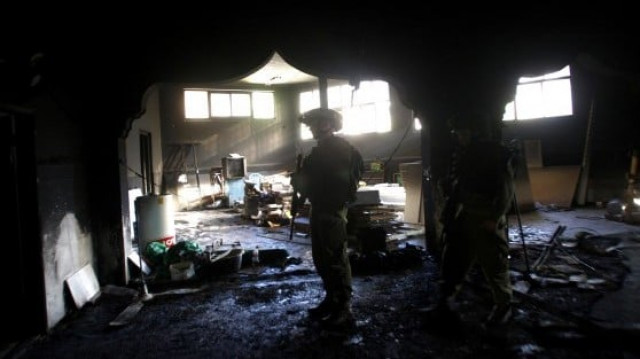West Bank mosque torched in suspected revenge attack
A mosque in the same village was set ablaze in a similar attack in 2012

Months of unrest have escalated in recent days, spreading from annexed east Jerusalem to the occupied West Bank and Arab communities across Israel, and raising fears of a new Palestinian uprising.
In a televised address late on Tuesday, Israeli Prime Minister Benjamin Netanyahu said he had ordered a raft of additional security measures nationwide to tackle escalating Arab protests.
The pre-dawn arson attack on a mosque near the Jewish settlement of Shilo came after separate Palestinian knife attacks on Monday killed a settler in the southern Western Bank and an Israeli soldier in Tel Aviv.
"The settlers set fire to the whole of the first floor of the mosque" in Al Mughayir village near the West Bank city of Ramallah, a security official said. Police confirmed the incident and opened an investigation.
Also overnight, a molotov cocktail was thrown at an ancient synagogue in the Arab Israeli town of Shfaram, causing minor damage, police said.
The structure is not currently used for worship.
The attack on the mosque came with Palestinian anger already running high after Israeli troops shot dead a protester in the southern West Bank on Tuesday.
The death of the 22-year-old near Hebron came as troops tried to disperse about 150 Palestinians who were hurling rocks and Molotov cocktails at passing cars close to the Kiryat Arba settlement, the army said.
Since the current round of violence began five months ago with the kidnapping of three Israeli teenagers by militants, at least 17 Palestinians have been killed in the West Bank, according to an AFP count.
US Secretary of State John Kerry was headed to neighbouring Jordan for talks with King Abdullah II that were expected to focus on the worsening unrest as well as the US-led campaign against the Islamic State group in Iraq and Syria.
Jordan, whose role as custodian of Muslim holy sites in east Jerusalem is enshrined in its 1994 peace treaty with Israel, has expressed mounting concern over Israel's actions at the flashpoint Al Aqsa mosque compound.
A campaign by far-right Jewish fringe groups to secure prayer rights inside the compound - one of the most sensitive sites in the Middle East - has fuelled tensions that were already high because of Israeli settlement expansion in the city's annexed eastern sector.
Speaking late on Tuesday, Netanyahu said he had decided to "reinforce security measures across the country, destroy terrorist houses, implement a stringent policy against those throwing stones and Molotov cocktails, and fine the parents of stone throwers."
He also blasted Palestinian president Mahmud Abbas for "inciting more violence".
He was alluding to a speech Abbas gave to mark the 10th anniversary of the death of his iconic predecessor Yasser Arafat in which he vowed the Palestinians would "defend Al Aqsa and the churches" against Jewish extremists.
Nearly 10 years after the second Palestinian uprising (2000-2005) petered out, Israeli commentators questioned whether the surge in violence marked the start of a new intifada. But Defence Minister Moshe Yaalon said it was too early to say.
"We don't see the masses going out onto the streets (in the West Bank). What we do see in certain places is youths who are participating in popular terror, and principally, we are seeing lone attackers," he told reporters. "So what do we call it? It's clear there is an escalation, an increase in violence but what shall we call it? Let's wait and see."
But he urged the public to be alert, warning Israel had to prepare for "the possibility of a further escalation".
Israel has significantly increased the police presence on the streets in recent months in a bid to rein in the unrest, but has been unable to stop a growing number of attacks by lone Palestinians, most of them in Jerusalem.



















COMMENTS
Comments are moderated and generally will be posted if they are on-topic and not abusive.
For more information, please see our Comments FAQ